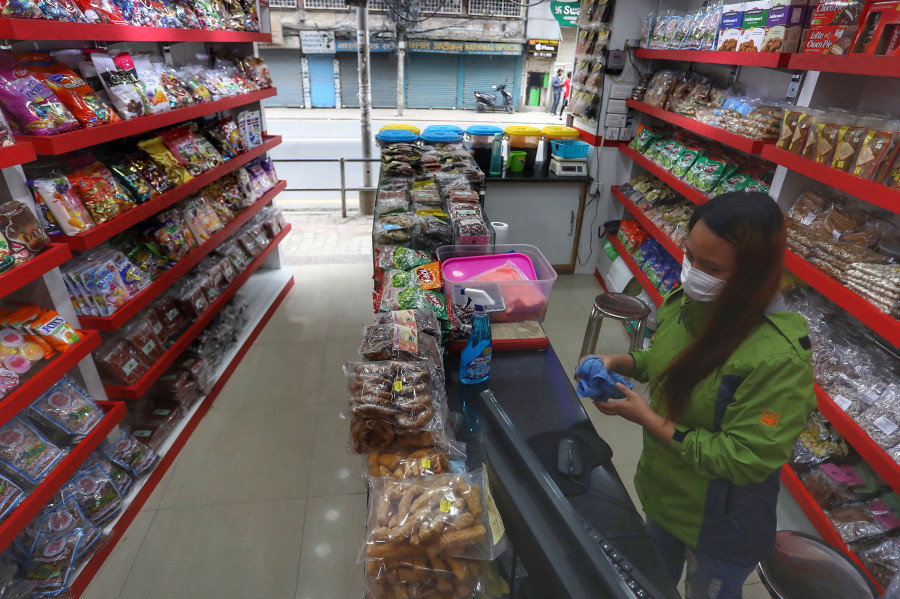Money
Grocery shoppers scramble due to small window of time
It is challenging to finish making deliveries by early morning, traders say.
Krishana Prasain
When Mukunda Subedi went to buy milk and yogurt from a nearby grocery store on Friday morning, it had already closed, and he had to return empty-handed.
“My wife is fasting today, so I was planning to buy an extra packet of milk, but I couldn't get any,” said the Bagdol, Lalitpur resident.
The shop was open till 8 in the morning on Thursday, but on Friday it had already shuttered, said Subedi. He tried a few other stores, but they were either closed or sold out.
The restriction order that went into effect from midnight Wednesday in the Kathmandu Valley has made it difficult for people to buy groceries like dairy products and vegetables even though the government had announced that transportation of essential supplies would not be obstructed, traders said.
The government has provided a small window of time to buy and sell groceries, and this has made life hard for customers and traders alike.
Vegetable supplier Sujan Shrestha said his delivery boys on motorcycles were pulled over by the traffic police and made to wait for an hour. They were returning to the farm after delivering a shipment to the Balkhu vegetable market.
Shrestha, owner of Bishesh Sadabahar Krishi Farm, Ramkot who also operates his own vegetable shop at Swayambhu, said that half of his fresh produce were wasted because of the very little time allowed to sell them in the early morning.
“We do not have a van and have been supplying vegetables to major fruit and vegetable markets by motorcycle. My delivery boys do not have any ID cards which gets them into trouble on the return trip,” said Shrestha.
He said that prices of vegetable had also swelled. “We were selling tomato at Rs1,600-Rs1,700 per crate on Wednesday evening, and the next morning the price had jumped to Rs2,000-Rs2,200,” he said. "Middlemen point to transport restrictions and reduced supply for the increase in prices," he added.
Binaya Shrestha, deputy director at the Kalimati Fruits and Vegetable Market Development Board, said supply and distribution had been affected following the restriction order. According to the board, the market supplied 453,023 kg of vegetables and fruits on Thursday. The quantity had shrunk to 117,382 kg on Friday.
"The restriction order has resulted in a drop in supply of vegetable as the market is allowed to remain open only from 1 to 7 am," he added.
Resham Tamang, administrator at the Balkhu Agriculture Vegetables Market, said that supply had declined with a drop in transactions in the market. “Only 60 percent of the usual shipments of vegetables have arrived, and keeping the market closed all day has made them rot,” he said.
The Nepal Dairy Association said that the government had declared that essential services would be allowed to operate freely, but the police administration has been stopping vehicles carrying dairy products and shutting down dairy counters.
Dairy products are highly perishable products, and in the current hot temperatures, they spoil even faster, said Prahlad Dahal, general secretary of the association. When shops are not allowed to open, traders suffer heavy losses, he added.
“It is challenging to finish deliveries by 7 am. We should be provided time slots in the morning and evening,” he said. "It is difficult making deliveries to retail stores," he added.
According to the association, the Kathmandu Valley accounts for 60 percent of total sales, and obstructing supply will lead to much product damage.
Dairy companies had produced a large range of products targeting the festival, but the expected boost in business did not happen because of the restriction order, he said,
The dairy sector accounts for 9 percent of the agricultural gross domestic product. There are 500,000 farmers engaged in the sector, and it provides jobs to 30,000 people directly, according to the association.
The dairy industry pays Rs1 billion in taxes to the government annually. It has been incurring losses totalling Rs10 million daily since the lockdown started as factories have been operating at 40-50 percent capacity, he added.
Consumers say grocery stores should be kept open all day so crowds don't form. “The shops are not allowed to open in the evening. I don’t know what to do,” said Subedi.




 18.12°C Kathmandu
18.12°C Kathmandu













